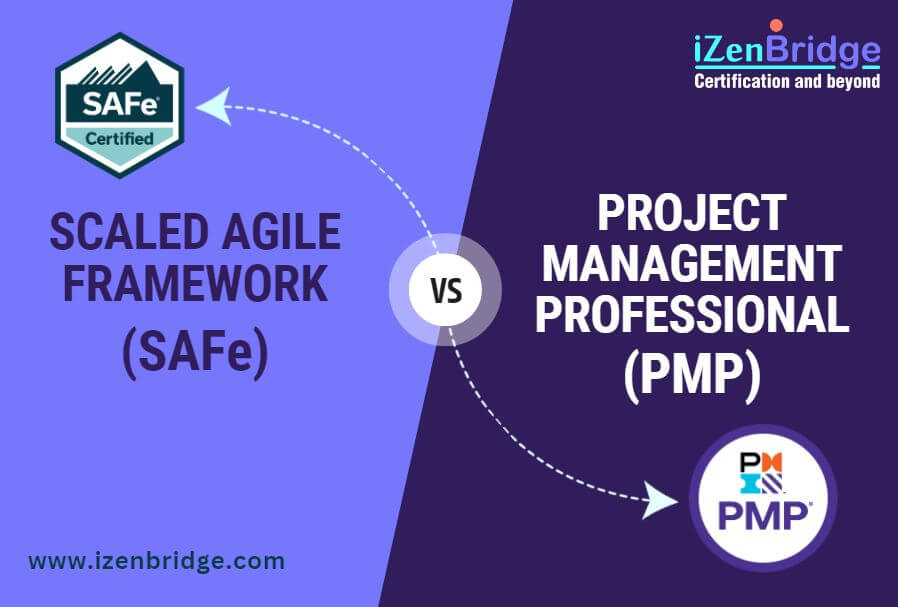

The popularity of Scaled Agile Framework (SAFe) and Project Management Professional (PMP) certifications has grown significantly in recent years, driven by organizations’ desire to enhance their business agility and project management strategies. While both SAFe and PMP certifications provide professionals with current and applicable work methods, they differ in their approach and emphasis. A considerable number of our clients hold both PMP and SAFe certifications. This article delves into the distinctions between PMP and SAFe Certifications.
Scaled Agile Framework (SAFe) and Certifications:
SAFe is a freely available knowledge base providing a comprehensive approach for organizations to implement Agile practices. The framework is built on principles from Agile, Lean, DevOps, Theory of Constraints, Product Development Flow, and many more, making it a holistic approach to Agile implementation. SAFe forms a group of agile teams into large Agile teams, known as “Agile Release Trains” (ARTs), which facilitate the application of Agile approaches in larger contexts.
The SAFe framework focuses on continuous development capacity through ARTs, delivering business results rather than managing individual projects. Organizations set strategic goals and build development capacity by budgeting on Product and Solution lines and keep doing initiative development regularly. SAFe also offers portfolio management capabilities, enabling organizations to identify and analyze initiatives, create business cases, and decide whether to pursue them.
SAFe has many Training and Certification programs, including Leading SAFe, SAFe Scrum Master (SSM), SAFe Product Owner/Product Manager (SAFe PO/PM), and SAFe Advanced Scrum Master (SASM). These programs equip professionals with the knowledge and skills needed to implement SAFe practices in their organizations. The Leading SAFe certification is recommended for those with foundational Agile knowledge who want to understand how to apply Agile principles on a larger scale.
SAFe certifications are recommended for professionals working in environments where Agile is used for large teams. In addition, if your organization or client’s organization has adopted Agile and plans to scale it organization-wide, SAFe knowledge will be valuable.
Project Management Professional (PMP) Overview
PMP certification, offered by the Project Management Institute (PMI), assesses an individual’s ability to design context-sensitive frameworks or approaches for given projects. The certification does not test a specific way of working but rather evaluates an individual’s capacity to develop various work methods tailored to project needs. PMI publishes various standards on improving project management, with its flagship standard known as the Project Management Body of Knowledge (PMBOK).
PMP certification tests the ability to apply skills in three categories for delivering project value, People, Process and Business. In addition, the certification tests the ability to apply agile, predictive, and hybrid approaches based on the project context. The PMP is in the market for many decades and has a wide range of acceptance, making it valuable for professionals seeking career growth or pursuing opportunities in international settings.
Exam Comparison
| Area | PMP | Leading SAFe (SAFe Agilist) |
|---|---|---|
| Focus | Demonstrating skills in using Project Management using context-based approach | Demonstrating skills in Leading SAFe implementation in the organization. |
| Typical Time Taken | 2 Months | 1 Week |
| Study Effort | 100-150 Hours | 20 to 30 Hours |
| Exam | Center Based or Proctored | Browser Based / Non Proctored |
| Exam Duration | Around 4 Hours | One and Half hour |
| Number of Questions | 180 | 45 |
Who Should Pursue SAFe Certification and Who Should Pursue PMP Certification?
SAFe certifications are recommended for professionals working in environments where Agile is used for large teams. If your organization or client’s organization has adopted Agile and plans to scale it organization-wide, SAFe knowledge will be valuable. The Leading SAFe certification is recommended for those with foundational Agile knowledge who want to understand how to apply Agile principles on a larger scale.
PMP certification is ideal for professionals involved in project management across various industries. The certification signals a strong understanding of project management principles and practices, as outlined in the PMBOK and beyond. PMP certification is globally recognized, making it valuable for professionals seeking career growth or pursuing opportunities in international settings.
SAFe and PMP certifications are not mutually exclusive, and professionals can pursue both certifications to enhance their job prospects and project management skills. However, the choice between the two depends on the individual’s career goals, the organization’s Agile adoption level, and the nature of the projects they work on.
| Name | Date | Place | – |
| SAFe Certification and Training | 5 – 6 July 2025 | Chennai | More Details |
| SAFe Certification and Training | 20 – 21 July 2025 | Bangalore | More Details |
| Name | Date | Place | – |
| PMP Certification and Training | 17 July – 15 Aug 2025 | Bangalore | More Details |